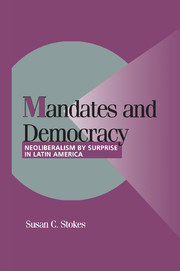Book contents
- Frontmatter
- Contents
- Preface
- 1 ELECTIONS, MANDATES, AND REPRESENTATION
- 2 ELECTIONS AND ECONOMIC POLICY IN LATIN AMERICA
- 3 EXPLAINING POLICY SWITCHES
- 4 ARE PARTIES WHAT'S WRONG WITH DEMOCRACY IN LATIN AMERICA?
- 5 NEOLIBERALISM WITHOUT MANDATES: CITIZENS RESPOND
- 6 MANDATES AND DEMOCRATIC THEORY
- 7 SUMMARY, PREDICTIONS, UNSETTLED QUESTIONS
- References
- Author Index
- Subject Index
- Titles in the series
Preface
Published online by Cambridge University Press: 10 December 2009
- Frontmatter
- Contents
- Preface
- 1 ELECTIONS, MANDATES, AND REPRESENTATION
- 2 ELECTIONS AND ECONOMIC POLICY IN LATIN AMERICA
- 3 EXPLAINING POLICY SWITCHES
- 4 ARE PARTIES WHAT'S WRONG WITH DEMOCRACY IN LATIN AMERICA?
- 5 NEOLIBERALISM WITHOUT MANDATES: CITIZENS RESPOND
- 6 MANDATES AND DEMOCRATIC THEORY
- 7 SUMMARY, PREDICTIONS, UNSETTLED QUESTIONS
- References
- Author Index
- Subject Index
- Titles in the series
Summary
In a conversation with a friend in a South American city, I mentioned my interest in the phenomenon of politicians sometimes promising things in campaigns and then, in office, changing course, as did the president of her country when he first took office. Anger flashed across her face, as she blurted out, “It was completely authoritarian what he did, changing like that. It was antidemocratic.”
A month later, in the same city, I presented some preliminary research findings at a scholarly seminar. The audience was social scientists and historians of varying political leanings. In their writings, some present had excoriated the government's economic liberalization program and others extolled it. As I read quotes from their president's speeches in the previous presidential campaign, their reaction was not anger of the sort my friend had expressed but irony. Laughter broke out as I read the then-candidate's pronouncements, his promises not to raise prices – as he later did – and privatize industry – as he later would do – and to protect local business against foreign competition – which he later failed to do.
Why was ironic laughter, not anger, the response of this sophisticated audience, who seemed almost to have forgotten the discarded statist identity of the candidate-cum-president? To be sure, many had condemned the change of policies at the time they were announced. But as time passed and the election receded, the political debate was not over consistency and candidates who mislead but over the policies themselves.
- Type
- Chapter
- Information
- Mandates and DemocracyNeoliberalism by Surprise in Latin America, pp. xi - xivPublisher: Cambridge University PressPrint publication year: 2001
- 1
- Cited by

